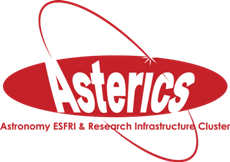Update: The presentations and proceedings of the symposium are online available.
The ASTERICS collaboration is pleased to announce the symposium:
The New Era of Multi-Messenger Astrophysics
Martini Plaza, Groningen - The Netherlands
Monday 25 to Friday 29 March 2019
The past few years have been pivotal for multi-messenger astrophysics, with the first detection of gravitational waves from the merging of two neutron stars and the recent announcement of a high-energy neutrino event detected by IceCube coincident in direction and time with a gamma-ray flare from a blazar detected by Fermi. Gravitational Wave and Neutrino sources and their electromagnetic counterparts, together with new developments in transient astronomy, are a vibrant field where the nature of many phenomena is still unknown or debated. Furthermore, the generation of new sensitive, wide-field instrumentation across the entire electromagnetic and astroparticle spectrum (SKA, CTA, KM3NeT, ELT, Athena) are set to radically change the way we perceive the Universe. In the next decade, space and ground-based detectors will jointly explore the Universe through all its messengers. Adequate e-infrastructures and algorithms will be needed to manage and analyse the data.
We look forward to welcoming you to discuss the recent developments in the fields of gravitational waves, astrophysical neutrinos, the highly energetic dynamic sky, and to explore new methods for multi-messenger science and the related research infrastructures.
The conference is hosted by the Netherlands Institute for Radio Astronomy (ASTRON) on behalf of the ASTERICS collaboration at Martini Plaza in Groningen, The Netherlands. ASTERICS is a Horizon 2020 funded project that collects knowledge and experiences from astronomy, astrophysics and particle physics and fosters synergies among existing research infrastructures and scientific communities, with the ambition of seeing them interoperate as an integrated, multi-wavelength and multi-messenger facility.
Invited speakers:
- Imre Bartos, University of Florida, United States of America
- Elisa Bernardini, DESY, Germany
- Françoise Genova, CNRS - Centre de Données astronomiques de Strasbourg, France
- Giancarlo Ghirlanda, INAF - Brera Astronomical Observatory, Italy
- Jason Hessels, ASTRON / University of Amsterdam, The Netherlands
- Piotr Homola, Institute of Nuclear Physics PAS, Poland
- Samaya Nissanke, University of Amsterdam, The Netherlands
- Judith Racusin, NASA Goddard Space Flight Center, United States of America
E-mail: locasterics@astron.nl



